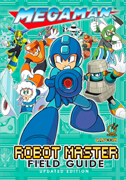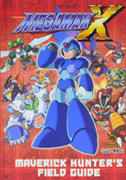
Editorial: Mega Man Must Reach for a New Paradigm
 Mega Man has had a pretty tough run this year, that much is obvious. What I believe may be less obvious, however, is that the recent cancellations are a symptom of a much more troubling problem that has been deep beneath the Mega Man games for a very long time now: The series is now in need for some major innovation.
Mega Man has had a pretty tough run this year, that much is obvious. What I believe may be less obvious, however, is that the recent cancellations are a symptom of a much more troubling problem that has been deep beneath the Mega Man games for a very long time now: The series is now in need for some major innovation.
Wait, that’s entirely wrong; the problem has nothing to do with innovation. What Mega Man needs is something it has seldom ever done in its near 25 year lifespan. Mega Man needs to reach for a new paradigm.
When it comes to an established game series, there are ultimately three paths it can take:
- Reach for a new paradigm (or innovate/experiment and hope it sticks).
- Figure out what’s “good enough” and coast on that.
- Die, or go on hiatus (though it’s hard to tell the difference sometimes).
The problem with Mega Man is that, for the majority of its existence, it has been set on #2. And I can’t necessarily say this has been bad; after all, the series has come this far already. We’ve continued to get low risk, low expectation Mega Man games for the better part of 20 years, and it has established a decent fan base that will accept this. For Mega Man, this began with Mega Man 4. Let’s take a look:
Mega Man: Six Robot Masters. Ten stages. Decent though fairly rigid platforming mechanics.
Mega Man 2: Eight Robot Masters. Fourteen stages. Refined mechanics and better balance. Password system. E-Tanks.
Mega Man 3: Eight Robot Masters, plus the eight from the last game. Nineteen stages (counting Break Man). Sliding. Rush.
Mega Man 4: Eight Robot Masters. Sixteen stages. Charged shot. Uhm… adapters?
Personally speaking, Mega Man 4 is one of my favorites. The game has some outrageously, deliciously good music. It also has a cast of good Robot Masters, even though some are a bit goofy. (Fun fact: I was almost Dust Man instead of Heat Man back when I was getting my “start” in the community.)
But when you compare content, Mega Man 4 is a big step back from Mega Man 3. This may be natural since Keiji Inafune has gone on record saying how frustrating Mega Man 3‘s development was. So with Mega Man 4, they played it safe. That founded the basic structure all platforming Mega Man games would take.
This is why Mega Man gained a reputation for being stale. Sure, they added new features in the following games, but these were ultimately just icing and gimmicks. There was nothing wrong with the gameplay, the theme was something most anyone could understand, and the games were not too reliant on story. It’s simply that the games stopped trying to reach for more, stopped trying to get bigger. Because of this, the low risk, low expectation model of putting out games cannot subsist forever. These games are riding the waves of excitement and interest caused by the original games.
When I say Mega Man needs to reach for a new paradigm, I mean it needs to raise the bar on what it offers. As technology advanced, the games got new features: prettier graphics, higher fidelity sound, animated movie scenes, and voice acting. But there was still no more content than Mega Man 4 had. Though the capacity for more content existed, all the effort went towards adding more icing.
Reaching a new paradigm is different from innovating, which means trying something new. Unfortunately, it has also become a pesky buzz word, and there has been a lot of innovating for the sake of innovating. “Innovating” is what brought about Mega Man Battle & Chase and Super Adventure Rockman. “Innovating” is Mega Man X games with aggravating Ride Chaser stages. “Innovating” is Mega Man X7.
It’s not a bad thing to innovate, but there must be a reason to first. The classic Mega Man formula was proven with Mega Man 2, Mega Man 3, and Mega Man X (all of which are worldwide million sellers). There is no need to fix or change what these games offer, just push them to the next level.
This was proven with Mega Man 9, which had a tremendous amount of excitement behind it. This is because there hadn’t been a proper Mega Man game for so many years. Yes, there had been additional X games, the Zero series, and the ZX series in the meantime. But these… well, I don’t think they quite filled the void; didn’t satiate the hunger. I’m not going to speculate on why here, but needless to say Mega Man 9 generated a kind of excitement these others games really didn’t.
The irony is that Mega Man 9 was still a “good enough” game. Eight Robot Masters. Thirteen stages (not counting DLC). Heck, even the graphics and sound went in reverse. But because people were so hungry for a new Mega Man game proper, Mega Man 9 got a pass in the content department. If Mega Man 9 came out right after Mega Man 8, it would have probably been yawned off by all but dedicated Mega Man fans.
Which seems to be what happened with Mega Man 10. Although it did try to offer more content in very small ways, and didn’t have such cheaply built difficulty, it still followed the “good enough” formula, and the game didn’t sell as well as 9 by Capcom’s own admission. (In trying not to hurt the game’s feelings, Capcom phrased it that they were content with how both games did, but were more content with 9.)
The first three Mega Mans are very fondly remembered. Just take a look in UDON’s Mega Man Tribute. Or look at any fan-made crafts and merchandise. The vast majority is derived from the content of the first three Mega Man games. Until a new Mega Man game comes and causes a similar impact, all Mega Man games will simply be riding on the waves of those first three.
“But that’s just because of nostalgia! Retro games are chic and trendy!”
Nostalgia is not a “thing”. It’s not like a spice you can put in a batter to make a tastier cake. Nostalgia, at least as it applies to commercial products, occurs because something in the past was just that damn good. Nostalgia doesn’t make games good; rather, good games make nostalgia. And I don’t mean to put down peoples’ tastes, but 20 years from now there will be very little– if any– nostalgia for games like ZX and Star Force.
Another game that helps validate this is New Super Mario Bros. Wii. The 20 million-plus sales for this game show that people actively crave strong, well-made games that match the level of quality seen 20 years ago. And like Mega Man 9, New Super Mario Bros. Wii really did nothing to expand the content of Super Mario. It was many of the same types of worlds the past Super Mario games used, but because people had waited so long for a game of this style and caliber, they still ate it up. If Nintendo puts out another New Super Mario Bros. without expanding the content, its reception will probably mirror Mega Man 10‘s after following Mega Man 9.
“But Capcom tried making these games. Mega Man Powered Up and Mega Man: Maverick Hunter X totally bombed. And Mega Man Universe got scrapped in development!”
I’ll admit Powered Up and Maverick Hunter X puzzle me a little. Not so much in that they didn’t do well, but because they bombed so terribly. I cannot even find sales data for them, because they were not among the top 500 games for the year they came out. Many people cite the fact they were released exclusively on the PSP, and it’s true that they came out around the time the DS began to aggressively overtake the PSP. But ultimately I believe it’s more due to their being just remakes, which again did little to expand the content or raise the bar of their respective series. Additions like stage building and animated movies add little, if any value; no one was saying “I want to buy a Mega Man game, but first it needs a stage builder.”
Mega Man Universe is harder to speculate on, since we really don’t know what kind of game it’d have been. From the look we got, it appeared to be Mega Man 2 remade in a similar fashion as Powered Up, but with the implication of additional content added on from other Mega Man games, as well as other properties. However, one of the real problems seemed to exist in the game’s character customization feature. I’m sure this idea looked good on paper, but those who were able to try the game at the few events it appeared at complained about the controls, including how different character parts would alter Mega Man’s movement speed, jump height, and the like. For being a series founded in precision platforming, this was a bad design element.
“Okay well fine, what would you do?”
There really isn’t one right answer to this. The means can be varied, so long as they lead to the result of having a Mega Man game that breaks old boundaries.
The most basic method would be to simply make a new Mega Man game with more content. More Robot Masters, more stages, more weapons. Game discs today can hold gigabytes of data; there is no rational reason the number of Robot Masters, Mavericks, or whatever other kind of boss robot still needs to be eight. I expressed such an idea in my write up for reviving Mega Man Mania, which essentially offers no new content, but doesn’t need to be because it would have so much content, and at a value price. (Granted, the 3DS hasn’t panned out so well since then, but the platform isn’t so important.)
Another idea would be to expand upon the concept of the “endless mode”, which is probably the one truly good new addition to come of Mega Man 9. It really is a shame that had to be DLC, since I doubt everyone who bought Mega Man 9 and/or 10 felt inclined to get the DLC. It would have been better if Capcom made endless mode an included feature of the main game, and instead charged $15 for the game itself. Yes, endless mode is that good.
But you can do a lot more with that concept than stapling together stage segments at random, as an “endless” Mega Man game would be an interesting concept. Some considerations would be having larger stages with numerous branching paths, and you would only need to go to certain parts of stages depending on the missions. The stages themselves could change, depending on what boss robot is holding up there, or on the weather (a concept Mega Man Zero 4 used to a very small extent). Perhaps there’s a desert stage that becomes icy because Blizzard Man takes over. A brightly lit and flashy power plant level would be ideal for Bright Man, but when Cut Man takes over, he severs the power lines and makes a darker, more sinister stage.
Naturally, there would be a main storyline and an end game, but new missions would pop up all the time as you play. Stages could even change when you just go to explore them casually or revisit them, having different selections of enemies and different environmental effects, perhaps even surprise bosses. Such a concept might be better suited for a Mega Man X game. X basically has the role of a police officer, so it would make sense that new alerts and crises are being reported to the Hunter HQ.
Another way to build on this would be to include a concept of time, with enemy forces building up in an area you don’t visit for an extended period. Or let’s say you just stop playing the game for a few weeks; when you boot it up again, suddenly Dr. Wily has a massive super-fortress you have to tackle (or in the vein of X, numerous Maverick factions have aligned together and formed a terrifying army force).
This figures, since if the hero were to actually take time off saving the world, the enemy forces would build up. And it gives great incentive to return back to the game over and over.
And of course, another means is adding cooperative multiplayer. Being able to play through a stage with friends adds many new dynamics to enjoying a game without getting in the way of gameplay. Other platforming games have used this to great success (I again point to New Super Mario Bros. Wii), and in fact Capcom has its own precedent with Chip ‘n Dale’s Rescue Rangers. This concept is incredibly fun with arcade style games (Double Dragon, Contra, Kirby Super Star), and it’s a complete mystery as to why Mega Man games have yet to incorporate it (outside of a few spin-off titles); even one fan game has seemingly found a way to implement it convincingly.
This is just a handful of various ideas, but they all have a shared theme: they make use of the mechanics and gameplay that have been successful in the past, while throwing in additional content and/or putting a spin on how that content is enjoyed, without falling back on gimmicks or experiments. The design is meant to give you as much gameplay as possible, giving you a unique and fun experience every time you come back to play again, without putting up with anything unnecessary. Furthermore, by making such a content-laden game, it would be unnecessary to put out yearly sequels. Additional content could be added via DLC or expansions, but there would be little need to put out another fully fledged title until a yet a new paradigm needed to be met.
Again, this is not the only answer, as there could be new types of successful Mega Man games waiting to be thought up. I can’t begin to think of what they might be (if I could, I’d probably be working for Capcom instead of writing this), but what I can do is look back at the games that worked, try to analyze what made them work, and come up with concepts that push those strong elements to the next level, thus making a new paradigm.
As a Mega Man fan, I can be incredibly selfish. I really want Mega Man Legends 3 to be made, and I want them to get on Mega Man X9 and Mega Man 11, too. However, these games in a basic form would not make a new paradigm; they would continue to ride the waves caused by the first three Mega Man titles. It may be now, 20 years later, that those waves are starting to peter out. And it may very well be because of this that Mega Man faces such a tough lot now. With other series like Resident Evil, Street Fighter, and Monster Hunter currently going strong, it might become tough to even justify the “low cost, low expectation” Mega Man games.
Sooner or later, Mega Man will need to create a new impact. Mega Man can’t keep riding on the waves of the past, it needs to make new waves. Until that happens, the future of Mega Man will continue to be uncertain.
(Note: In this article I may sound a bit unfair to certain Mega Man games and series. Please take no offense; I am not saying these are bad games nor am I saying people shouldn’t enjoy them. The point is that they did not achieve the raising of the bar for Mega Man, nor did they create a great impact. Not every Mega Man game has to, but sooner or later, one will in order for us to keep getting these varied games. That’s the gist of my article.)
Prev/Next in Category(s)
Prev/Next by Date





Comments